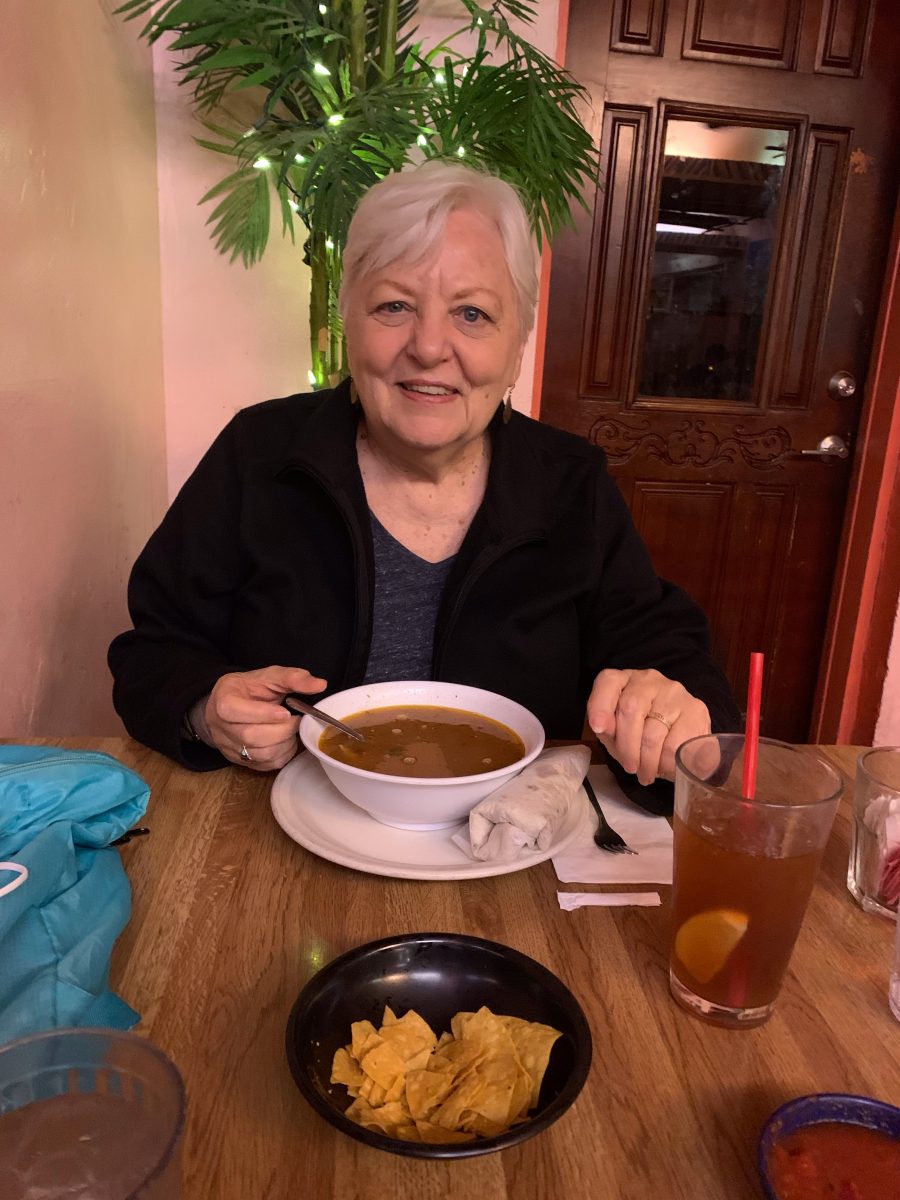Greetings from Tucson and Casa Alitas

Hi Bonnie – Thank you for your email. I’m going to use my response to you as a way of providing a brief update to a few others also. First off, it’s been a packed and wonderful few days, reorienting to Casa Alitas and settling in at my Mennonite Tucson home-away-from home. To answer your question, the number of migrants arriving at Casa Alitas is unpredictable and varies from 12 to 200 per day. In recent weeks, there were as many as 300 Haitians per day for a several days, then none. The majority of arrivals now are from Venezuela, Brazil and Ecuador and some who have made their way from farther south in South America.
There are many factors that affect the number of people arriving at Casa Alitas, but two at the moment are of major importance. The first is that a no-bid federal contract was recently (within the last two weeks) awarded to “Endeavors,” what is ironically called a welcome center on the border. Endeavors formally provided services for vets and is associated with Lutheran Social Services (I don’t know the direct link here). The head of Endeavors is the former Director of ICE whose tenure included the worse time of family separations. By contract, Endeavors is being paid $354/person/day, and it is staffed by people making big salaries – not volunteers. Hearing about it reminded me of the prison industry and its money-making capacity. Casa Alitas has received confirmation that Endeavors is receiving over 300 migrants per day. You can imagine the stories about mistreatment and conditions there. With this new contract in place and Border Patrol and ICE eating out the same pocket, arrivals to Casa Alitas during the past week have dwindled to as many as 12 a day, even though they are staffed to welcome hundreds. Very difficult and challenging situation. More to come.

The second factor of major concern to Casa Alitas staff is that, according to the Biden Administration, the Remain in Mexico is going to restart on November 1, 2021. How this will change what is actually happening at the border is difficult to guess, but it will for certain have an effect. The disappointment in the Biden administration runs deep here, not only at Casa Alitas but also among many others. One indication of this is that Justice for All signs dominant the lawns and along the highways.
I won’t go into it here, but I’ve also listened to stories from staff that are difficult to write about: people arriving at Casa Alitas with gun-shot wounds from the cartels, young mothers and babies arriving without their husbands because their husbands were “delivered” back across the border, and many who arrive with but minimal understanding or knowledge of things we take for granted. For example, I helped a little boy yesterday learn how to flush a toilet. It’s so easy to assume so much. Fortunately, Casa Alitas has medical staff available and people skilled in multiple languages, including the indigenous languages of Ecuador in particular. For me, I figure my Spanish vocabulary doubles every day by necessity with words you don’t learn in a Spanish textbook!
I’ve told folks at Casa Alitas that I’m there to do whatever needs doing. However, I think I’ll be slotted mainly at the help desk. I was trained yesterday is how to use their antiquated but functional system of tracking all kinds of necessary info. A primary responsibility of people at the help desk (usually two people at a time) is to book the airplane or bus tickets for people traveling to their sponsors. It’s also a catch all for the many other questions that people have. Major issues here are how to pay for airline or bus tickets. Some migrants have credit card numbers of their sponsors, some have cash, some have promised financing, others have pleading faces and only know that their sponsor lives at x street in Cleveland. Very complex and demanding, and also one of the most important roles at the center. Many people have never been in a major bus, let alone, major airport, so stress level is high as we explain how to get to the right place at the right time. Fortunately, Casa Alitas has volunteers that accompany people through the first steps at an airport but, needless to say, that’s just the beginning.
Also, I’m making plans for a day trip to the border with Los Samaritanos. There are few moments more memorable to me than delivering containers of water in the desert, and I look forward to a trip with a Samaritan colleague of years past.
To give you some sense of how I was welcomed here, I was actually met at the airport by a Casa Alitas site coordinator. That spoke wonders to me. We went directly to Casa Alitas. I frequently wear my Wisconsin T-shirt when I travel – it’s an automatic door-opener and even if I don’t know what’s happening with the Green Bay Packers or the Wisconsin Badgers, it’s a great conversation-started, even when I’m walking into a grocery store! When I arrived at Casa Alitas, several volunteers welcomed me with “Oh, we know about the support of people in Wisconsin – a special welcome to you.”
I’m also settling into my new digs, all arranged through the Mennonite Your Way resource. I refer to it as the Mennonite little black address book, addresses of Mennonites all over the world who welcome visitors into their homes. I’ve now been tagged a Mini-Mennie (Mennonite) and have thoroughly enjoyed meeting my Mennonite hosts. Now that I’ve found the local grocery store and NPR on the house radio, I’m feeling comfortable and relaxed in my new setting. I also got my Moderna booster today. Yeah!
Tonight I join the cousin of an ORUCC friend (Jill Westberg) for dinner, then I have arranged to attend Sunday worship at Southside Church, the first sanctuary church in the Southwest, with a Casa Alitas friend. Our ORUCC contingent visited Southside when we here as a group in 2015 (do I remember that year correctly?) and when they had a sanctuary person in residence.
Best wishes to all in Madison. It thrills me to share what we are doing in Wisconsin with friends here in Tucson.
Paz,
Ruthanne




